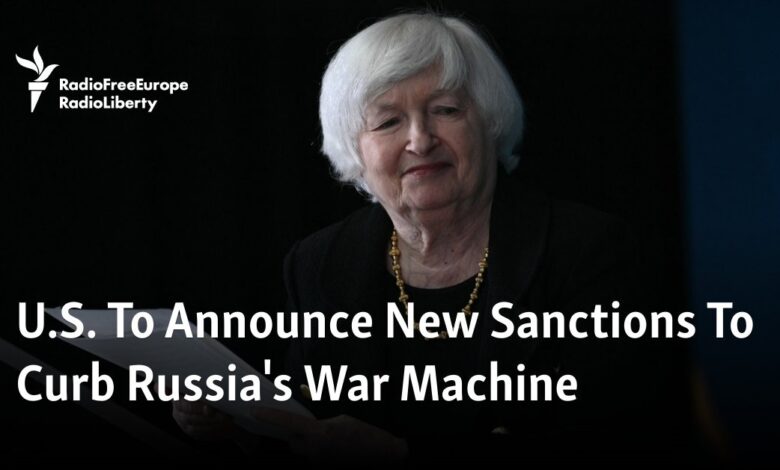U.S. To Announce New Sanctions To Curb Russia’s War Machine

President Maia Sandu said a knife-edge vote in favor of Moldova’s European integration has proven that Moldovans have chosen the European Union even while being bombarded with disinformation and manipulation.
With more than 99.68 percent of the vote counted, 50.45 percent of Moldovans voted “yes” for the EU, according to the Central Election Commission (CEC), which said on October 21 that the referendum a day earlier had been validated since it fulfilled the minimum accepted threshold of 33 percent turnout.
“The commission will present a report on the results of the referendum to the Constitutional Court, which, in turn, within 10 days, will confirm or deny, through a decision, the results of the plebiscite,” the CEC said.
The final outcome of the referendum, which for most of the night was tilted in favor of those who rejected closer integration with the 27-member bloc, appears to have been influenced by votes from Moldova’s strong Western diaspora.
“Despite all the problems, the manipulation, and disinformation, the majority of Moldovans showed us they know what is good for Moldova,” Sandu told a news conference in Chisinau.
“Citizens decided by a majority vote that Moldova will continue ahead on the path of European integration, Sandu said, adding that alleged attempts to buy votes were an “attack on Moldovan sovereignty.”
White House national-security spokesman John Kirby said the results showed that the country’s democracy remains strong despite an attempt by Russia to undermine it.
Kirby also hailed Moldova’s vote on the referendum as a step forward in Moldova’s European integration and said Russia did not succeed in undermining the country’s presidential election.
European Commission President Ursula von der Leyen said Moldova chose “a European future” despite “Russia’s hybrid tactics.”
A monitoring mission from the Organization for Security and Cooperation said that the elections were “well-managed” although they were marred by foreign interference and active disinformation efforts.
There was “intensive Kremlin-backed interference in the electoral process,” Petra Bayr, from the Parliamentary Assembly of the Council of Europe’s observer mission told a news conference.
In an earlier statement, Sandu said that the balloting came under an “unprecedented” assault from “criminal groups,” which tried to buy off as many as 300,000 votes with tens of millions of euros in an attempt to “undermine a democratic process.”
“Moldova faced today and in recent months an unprecedented assault on freedom and democracy,” Sandu said.
Sandu — in her reelection bid — came out on top of 11 candidates vying for the presidency, solidifying her initially slim lead as more results came in early on October 21, but falling short of the 50 percent margin needed to avoid a runoff.
With virtually all votes counted, Sandu was ahead with 42.31 percent and would face second-placed pro-Russian Socialist Alexandr Stoianoglo, who garnered 26.09 percent, in a runoff vote on November 3.
In third place was businessman Renato Usatii, a former mayor of Moldova’s second-largest city, Balti, with 13.72 percent of the votes.
Many observers billed Moldova’s dual elections as crucial to helping decide the nation’s future direction — whether it will feature closer ties to Europe and the West or turn more toward Russia.
The European Union also pointed to Moscow as being behind attempts to derail the elections.
“This vote took place under unprecedented interference and intimidation by Russia and its proxies, aiming to destabilize the democratic processes in the Republic of Moldova,” EU spokesman Peter Stano told journalists.
U.S. State Department spokesman Vedant Patel noted reports of “malicious cyber-activity, disinformation, and other things that are consistent with what we’ve seen the Kremlin do elsewhere and what the Kremlin has supported in its intent to undermine Moldova’s sovereignty.”
He said the State Department otherwise commended the Moldovan people for their participation in the election and referendum and will continue to support Moldova’s “commitment to ensuring a credible and democratic process.” The U.S. view continues to be that “Moldova’s future is in Europe,” he added.
Polish Prime Minister Donald Tusk, a former president of the European Council, hailed Moldova as a “brave nation” and Sandu as a “great leader.”
“Infuriate Moscow, impress Europe, save her country once again — that’s who Maia Sandu is,” Tusk said on X.
Russia, which maintains some 1,500 troops in Moldova’s heavily Russian-speaking breakaway region of Transdniester, has denied the allegations of meddling, with the Kremlin claiming the vote was “unfree” and calling on Sandu to provide proof that votes had been bought.
“If she is saying that she did not receive votes because of certain criminal groups, she must present evidence,” spokesman Dmitry Peskov said.
Chisinau’s Western backers have repeatedly expressed concerns about Russian influence in Moldova more than three decades after it gained independence from the Soviet Union.
Peskov also said the results showed a “hard-to-explain” increase in Sandu’s and the EU’s favor.
“What we see is a mechanically hard-to-explain rate of increase in votes in favor of Sandu and in favor of those referendum participants who favored an EU orientation,” Peskov said.
The amendments at issue in the constitutional referendum include confirmation in the preamble of Moldovans’ “European identity,” the “irreversibility of the European course” of the country, and integration as a national “strategic objective.”
A “no” vote in the referendum would not have precluded future EU membership, but it would have dealt a serious blow to Sandu and her pro-European allies and hampered accession efforts for years to come.
Turnout in the presidential vote was over 51.6 percent, or more than 1.56 million votes, as long lines were reported at some polling stations in Moldova and at sites outside the country, including France, Romania, Russia, and Greece.
The twin votes provide valuable lessons for Sandu’s allies and the opposition ahead of parliamentary elections next summer that will be a referendum on four years of rule by the Party of Action and Solidarity (PAS), which she founded eight years ago.
Moldova’s presidency holds limited direct power, but Sandu has parlayed her pro-Western message and leverage with the liberal PAS into limited reforms and formal EU candidacy for her fractured former Soviet republic.
Aside from stark warnings by local officials, including Moldova’s foreign minister, U.S. and other Western officials have pointed fingers at Russia, citing “very clear action by the Russians to undermine this upcoming election and referendum.”
Since his party was banned by the government and then the Moldovan Constitutional Court last year for allegedly fomenting a coup, convicted oligarch Ilan Shor has been accused of a multimillion-dollar scheme to pay anti-EU voters and influencers and has been linked to other schemes from his Russian exile to promote Russia among Moldovans and foment dissatisfaction with their government.
Days before the voting, authorities said they arrested four people and warned that dozens more had been trained in Russia and the Balkans to “destabilize” the country after the vote.




